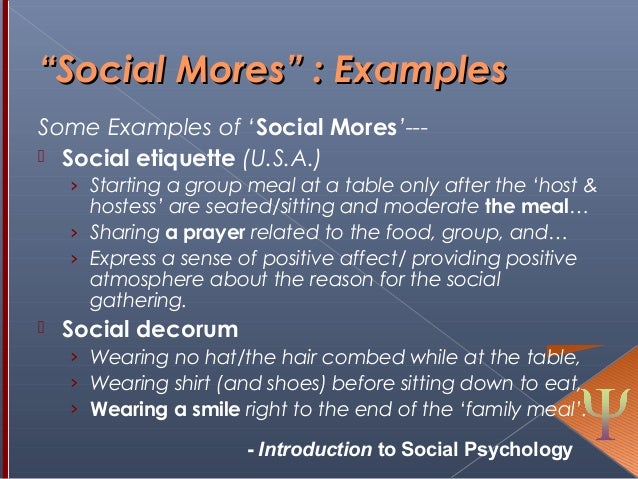Have you ever found yourself in a situation where you felt unsure of how to act, even though you knew the “rules”? This feeling probably stemmed from a conflict with **mores**, the unwritten, often unspoken, social norms that govern our behavior. Mores are more than just polite manners; they are the bedrock of our cultural understanding, dictating what’s considered acceptable, right, and even sacred within our communities.

Image: www.slideshare.net
Understanding mores is vital in navigating social interactions and avoiding awkward situations. They provide a framework for how we interpret and respond to various situations, shaping our values and influencing how we perceive others. This article will delve deeper into the concept of mores, exploring examples from various cultures and examining how they impact our lives.
Defining Mores and Their Impact
While often confused with **folkways**, which are less serious social customs, mores are distinct in their gravity. They reflect a society’s core values and beliefs, often rooted in moral and ethical principles. Violating a folkway might lead to a raised eyebrow or a chuckle, but violating mores could result in social ostracization, legal repercussions, or even violence.
Examples of Mores Across Cultures
Mores take diverse forms and manifest differently in various cultures. Here are some prime examples:
- Monogamy: In many Western cultures, monogamous relationships are considered the norm, while polygamy is seen as taboo. This reflects a strong emphasis on fidelity and commitment.
- Respect for Elders: Many Eastern cultures place high value on respecting elders, often reflected in bowing, using formal language, and prioritizing their needs. This reflects a reverence for tradition and familial hierarchy.
- Dietary Restrictions: Religious practices often influence dietary mores. For example, Halal and Kosher diets dictate specific food preparation and consumption rules, symbolizing adherence to religious principles.
- Dress Codes: Depending on the cultural context, specific clothing choices might be considered acceptable or inappropriate. For instance, wearing revealing clothing in certain religious settings could be seen as disrespectful.
The Evolution of Mores: A Tale of Change and Tradition
Mores are not static entities; they evolve over time as societies change and adapt. This evolution can be driven by various factors, including:
- Technological advancements: The internet revolution has significantly altered communication etiquette and privacy concerns, forcing societies to redefine some of their mores.
- Globalization: Increased global interaction and cultural exchange lead to blending and adapting of mores across different societies.
- Social Movements: Movements advocating for equality, justice, and human rights often challenge existing mores, pushing for social change and inclusive norms.

Image: helpfulprofessor.com
Mores in the Digital Age: Navigating the New Landscape
The rise of social media and the internet has created a complex digital landscape where conventional mores are being renegotiated. Issues like cyberbullying, online harassment, and the spread of misinformation have brought new challenges related to acceptable online behavior.
The constant evolution of communication mediums and the vast information access available online have blurred the lines between public and private spaces. This has forced societies to adapt and redefine their ethical boundaries in this new digital realm.
The Power of Mores: Shaping our Values and Our World
Mores are powerful social forces that wield influence over our personal choices, societal interactions, and even legal systems. They guide everything from how we greet each other to how we handle conflict and determine right from wrong. They influence our perception of ourselves and others, forming the foundation of our social identities.
Navigating the Unspoken Rules: Tips for Success
Understanding and respecting the mores of different societies can enhance your social interactions:
- Observation: Pay attention to how people behave in different settings and social contexts. This can offer clues about the unspoken rules.
- Questioning: Don’t hesitate to ask questions if you’re unsure about what is considered appropriate in a particular environment. Being open and curious can help you navigate unfamiliar social dynamics.
- Empathy: Try to see things from another person’s perspective, understanding that their behaviors might be shaped by different cultural norms than your own.
- Critical Thinking: Reflect on the impact of mores on society and question their inherent value. This can help you challenge outdated norms and advocate for positive change.
Mores Examples
Conclusion
Mores are the invisible threads that bind our societies together, shaping our behavior and creating a shared understanding of what is acceptable and unacceptable. By understanding and respecting these unwritten rules, we can cultivate harmonious social interactions and contribute to a more inclusive and informed world. So, as you navigate the intricacies of human interaction, remember the importance of observing, questioning, and embracing the evolving landscape of social norms. Your journey to understanding mores is just beginning, and with a little curiosity and empathy, you’ll be better equipped to navigate the complexities of life and make meaningful connections with those around you.






